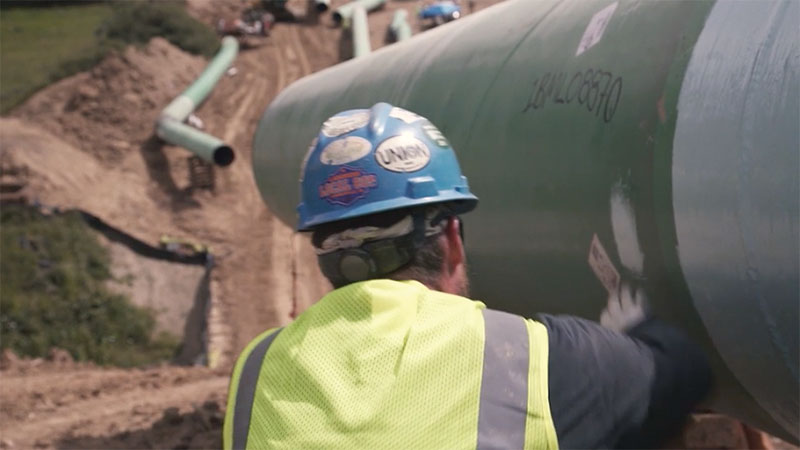August 2020, Vol. 247, No. 8
A Week Like no Other
Developers Cancel Long-Delayed Atlantic Coast Pipeline
P&GJ Staff Report
The developers of the long-delayed, 600-mile (965-km) Atlantic Coast Pipeline canceled the multistate natural gas project, citing recurring litigation, permitting uncertainties and mounting costs.

Despite being handed a U.S. Supreme Court win concerning a critical permit a month before making the announcement, Dominion Energy and Duke Energy said in a news release that “recent developments have created an unacceptable layer of uncertainty and anticipated delays” for the project designed to cross West Virginia and Virginia into North Carolina.
The companies cited recent court rulings that have thrown into question a permitting program used around the nation to approve oil and gas pipelines and other utility work through wetlands and streams as paramount in the decision.
“This new information and litigation risk, among other continuing execution risks, make the project too uncertain to justify investing more shareholder capital,” the two companies said.
The project, announced in 2014, attracted immediate opposition from some landowners and activists, who were concerned over construction work that would have necessitated tree removal and the leveling of some ridgetops to accommodate the 42-inch (1,067-mm) pipeline.
Additionally, opponents expressed concern that the project crosses hundreds of bodies of water and mountains, as well as tunneling under the Appalachian Trail.
“What we have been seeing in the last couple of weeks is a shift in the importance of communities and landowners – and their voices in this process,” said Greg Buppert, a lawyer for the Southern Environmental Law Center, which represented opponents of the Atlantic Coast Pipeline, told Reuters.
Opposition in court led to suspension of several permits, requiring extended construction delays. The Atlantic Coast Pipeline lagged years in its original schedule by the time the cancellation announcement was made; the original price tag had nearly doubled in that time, from $4.5 billion to $8 billion.
Economic development officials in poorer parts of the region hoped the project would have meant greater access to natural gas, attracting heavy manufacturing companies to the three states.
The canceled project will mean the loss of several thousand construction jobs, Brian Lego, research assistant professor at the WVU Bureau of Business and Economic Research, told the Charlotte Gazette-Mail.
“Once the pipeline would have resumed, there would have been a notable increase in construction activity across several counties in West Virginia,” Lego said. “Those are very high-paying, high skill-requirement construction and engineering jobs, in the six figures on an annualized basis.”
The Virginia Chamber of Commerce agreed in a statement, saying, “Unfortunately, today’s announcement detrimentally impacts the Commonwealth’s access to affordable, reliable energy. It also demonstrates the significant regulatory burdens businesses must deal with in order to operate.”
U.S. Energy Secretary Dan Brouillette said the project was killed by the “well-funded, obstructionist environmental lobby.”
“The Trump Administration wants to bring the benefits of reliable and affordable energy of all kinds to all Americans,” Brouillette said. “Unfortunately, the same can’t be said for the activists who killed this project.”
Separately, Dominion, which is headquartered in Richmond, Va., and serves more than 7 million customers in 20 states, said it will sell “substantially all” of its gas transmission and storage segment assets to an affiliate of Berkshire Hathaway in a $9.7 billion transaction.
The Dominion assets include more than 7,700 miles (12,300 km) of natural gas storage and transmission pipelines and about 900 Bcf (25 Bcm) of gas storage that Dominion currently operates, the company said.
Dominion previously committed to “net-zero” greenhouse gas emissions by 2050 as had Duke, which is headquartered in Charlotte, N.C.
A third partner in the Atlantic Coast Pipeline, Southern Company, sold its small stake in the project earlier this year to Dominion, the lead developer.
“We regret that we will be unable to complete the Atlantic Coast Pipeline,” Dominion CEO Tom Farrell and Duke CEO Lynn Good said in a joint statement. “For almost six years we have worked diligently and invested billions of dollars to complete the project and deliver the much-needed infrastructure to our customers and communities.”
American Petroleum Institute President and CEO Mike Sommers and North America’s Building Trades Unions President Sean McGarvey issued a joint statement Sunday night in response to the project cancellation:
“The cancellation of the Atlantic Coast Pipeline sets America back by denying working families and businesses access to affordable and cleaner U.S. natural gas and halting thousands of middle-class sustaining jobs,” they said.
“Like too many shovel-ready projects before it, the Atlantic Coast Pipeline faced legal and permitting challenges waged without merit by activists, and these challenges ultimately cost Americans along its route the environmental, employment and economic benefits that modern pipeline projects bring.”





Comments